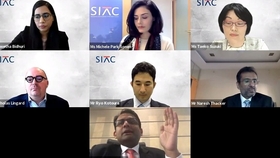The year 2020 will forever be etched in history as the one that brought the world to its knees with the emergence of a novel coronavirus, later named SARS-CoV-2, and the disease it caused, officially designated as COVID-19 (Corona Virus Disease 2019). This global pandemic has reshaped our daily lives, economies, and societal structures, forcing us to redefine terms and concepts in English that directly relate to the virus and its aftermath. This article delves into some of the key English words and phrases associated with the COVID-19 pandemic, exploring their meanings, their impact on our language, and their significance in understanding the ongoing crisis.
1.SARS-CoV-2 (Severe Acute Respiratory Syndrome Coronavirus 2)
At the center of the COVID-19 storm lies SARS-CoV-2, a beta coronavirus that first surfaced in late 2019. The term "SARS" stands for Severe Acute Respiratory Syndrome, a reference to a previous coronavirus outbreak in 2002-2003 that infected over 8,000 people globally. The "-CoV" denotes coronaviruses, a large family of viruses that cause illnesses ranging from the common cold to more severe diseases like SARS and COVID-19. The number "2" indicates it is the second known member of this family to cause a pandemic.
2.COVID-19 (Corona Virus Disease 2019)
COVID-19 is the official name given to the disease caused by SARS-CoV-2. It is an acronym that stands for "Corona Virus Disease of 2019," highlighting the year of its initial identification. This term has become ubiquitous, used not only in medical contexts but also in everyday conversations, news headlines, and social media posts.
3.Pandemic (noun)
A "pandemic" refers to a widespread epidemic, specifically one that affects a large proportion of the global population. The use of this word in 2020 signified the escalation of COVID-19 from a local outbreak to a global health emergency. It highlights the interconnectedness of our world and the need for collective action to combat such threats.
4.Lockdown (noun/verb)
"Lockdown" refers to the implementation of strict measures to restrict movement and gatherings in an attempt to slow down the spread of the virus. This word has become synonymous with the response strategies adopted by governments worldwide, including total or partial bans on public transportation, closure of non-essential businesses, and stay-at-home orders. Its usage has significantly altered our understanding of personal freedom and collective responsibility during times of crisis.
5.Social Distancing (noun/verb)
Social distancing is a strategy aimed at reducing close contact between individuals to prevent the spread of infectious diseases. It involves maintaining a physical distance of at least six feet (two meters) between oneself and others when possible. This term has become a daily routine for millions, altering how we interact socially and professionally, fostering virtual meetings and online classes.
6.Flattening the Curve (phrase)
"Flattening the curve" refers to a strategy aimed at managing the spread of an infectious disease by reducing its transmission rate, thereby slowing down the increase in cases over time. This phrase visually represents how a sharp rise in infections can be flattened into a more manageable peak if enough people adhere to social distancing measures. It highlights the importance of collective action in mitigating the impact of a pandemic.
7.Contact Tracing (noun/verb)
Contact tracing involves identifying individuals who have come in close contact with someone who has tested positive for COVID-19 and then monitoring them for symptoms or testing them for infection. This process aims to contain the spread by quickly identifying and isolating those who may have been exposed. The term has become crucial in many countries' efforts to control outbreaks and prevent further transmission.
8.Vaccination (noun/verb)
The development and distribution of vaccines against COVID-19 have been a pivotal moment in the fight against the pandemic. "Vaccination" refers to the administration of a vaccine to induce immunity against a particular disease. The rapid response to COVID-19 has seen unprecedented efforts in vaccine research, production, and distribution, with "vaccination" becoming a word of hope for many as it signals a potential end to the pandemic.
9.Variant (noun)
As the pandemic progressed, new strains or "variants" of SARS-CoV-2 emerged, each with its own characteristics that could affect its transmissibility, severity, or response to existing treatments or vaccines. Variants have raised concerns about the effectiveness of existing measures and vaccines and underscored the importance of ongoing research and adaptation in combating the virus.
10.Recovery (noun/verb)
The term "recovery" has taken on new meaning during the pandemic, referring not only to an individual's physical or mental health after contracting COVID-19 but also to economies' and societies' resilience in the face of adversity. It encapsulates the hope for a return to normalcy, albeit with new norms and precautions, as well as the recognition that recovery will be long and complex, requiring ongoing support and adaptation.
Conclusion: A Lingua Franca in Crisis
The COVID-19 pandemic has transformed our language, creating new words and redefining existing ones to reflect the unique challenges we face as a global community. These terms—SARS-CoV-2, COVID-19, pandemic, lockdown, social distancing, flattening
转载请注明来自爬爬百科,本文标题:《COVID-19的冲击,关键英语词汇的全面审视》












 京ICP备11000001号
京ICP备11000001号
还没有评论,来说两句吧...